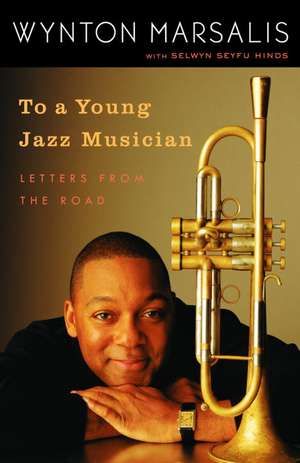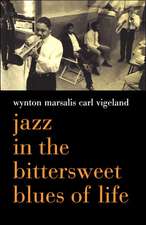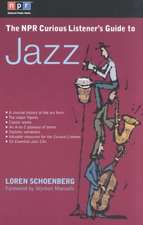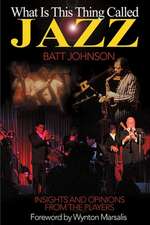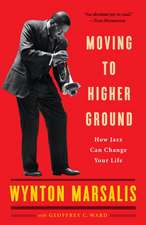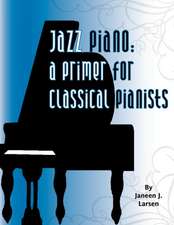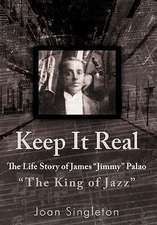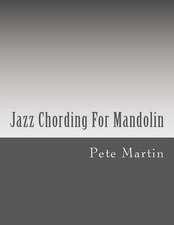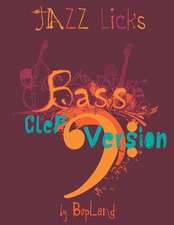To a Young Jazz Musician
Autor Wynton Marsalisen Limba Engleză Paperback – 2 feb 2006
Writing from the road “between the bus ride, the sound check, and the gig,”
Marsalis passes on wisdom gained from experience, addressed to a young musician coming up–and to any of us at any stage of life. He writes that having humility is a way to continue to grow, to listen, and to learn; that patience is necessary for developing both technical proficiency and your own art rather than an imitation of someone else’s; and that rules are indispensable because “freedom lives in structure.”
He offers lessons learned from his years as a performer and from his great forebears Duke Ellington, Charlie Parker, and others; he explores the art of swing; he discusses why it is important to run toward your issues, not away; and he talks about what to do when your integrity runs up against the lack thereof in others and in our culture. He poetically expresses our need for healers: “All of it tracks back to how you heal your culture, one patient at a time, beginning with yourself.”
This is a unique book, in which a great artist offers his personal thoughts, both on jazz and on how to live a better, more original, productive, and meaningful life. To a Young Jazz Musician is sure to be treasured by readers young and old, musicians, lovers of music, and anyone interested in being mentored by one of America’s most influential, generous, and talented artists.
From the Hardcover edition.
Preț: 103.36 lei
Nou
Puncte Express: 155
Preț estimativ în valută:
19.78€ • 20.57$ • 16.33£
19.78€ • 20.57$ • 16.33£
Carte disponibilă
Livrare economică 24 martie-07 aprilie
Preluare comenzi: 021 569.72.76
Specificații
ISBN-13: 9780812974201
ISBN-10: 0812974204
Pagini: 118
Dimensiuni: 147 x 203 x 8 mm
Greutate: 0.16 kg
Editura: Random House Trade
ISBN-10: 0812974204
Pagini: 118
Dimensiuni: 147 x 203 x 8 mm
Greutate: 0.16 kg
Editura: Random House Trade
Notă biografică
WYNTON MARSALIS was born in New Orleans, and went on to study at the Juilliard School of Music. He is now the artistic director of Jazz at Lincoln Center. Marsalis has won nine Grammy awards in both jazz and classical categories. In 1987, Marsalis’s oratorio on slavery and freedom, Blood on the Fields, became the first and, to date, only jazz composition to win the Pulitzer Prize in music.
SELWYN SEYFU HINDS is the former editor in chief of The Source magazine and is currently the executive editor of Savoy magazine. He is the author of the memoir Gunshots in My Cook-Up: Bits and Bites from a Hip-Hop Caribbean Life, and his articles have appeared in Vanity Fair, Spin, Vibe, and other publications.
From the Hardcover edition.
SELWYN SEYFU HINDS is the former editor in chief of The Source magazine and is currently the executive editor of Savoy magazine. He is the author of the memoir Gunshots in My Cook-Up: Bits and Bites from a Hip-Hop Caribbean Life, and his articles have appeared in Vanity Fair, Spin, Vibe, and other publications.
From the Hardcover edition.
Extras
Chapter 1.
The Humble Self
June 4, 2003
Dear Anthony,
Today would have been a good day for you to hang with us. We just pulled into Maine for a performance. Did the usual bit: check in at the hotel, head to the venue for sound check, back to the hotel to change for the show. Oh, and look for lobster. I also had a chance to talk to some kids about playing. They were high school age, a bit younger than you. People filled the school auditorium—dads, moms, brothers, and sisters, cousins. All watched the kids in the school’s jazz band. Those kids did okay. It touched me to hear them play so earnestly, to watch them listen so intently in their effort to get better. And I love the feeling of pride and expectation that pours out from the families as they enjoy the results of hard work on display. You should have seen the drummer; fifteen years old. Trying to be so cool we called him Ice. He looked great, but damn sure wasn’t swinging. Afterward, I ended up telling ’em the usual: stay encouraged, play with each other, and keep practicing. I wonder sometimes if saying “practice” is enough. Practice what? Talking with those kids brought to mind something someone once asked John Coltrane, “Trane, when do you practice?”
“I only practice when I’m working on something,” he replied.
Yeah, man, you can play tunes forever. Play enough, play every night, and you’ll get to blow on a lot of songs. Experienced players get to know the changes and play a lot of standards. But you, and those kids in Maine, don’t have Coltrane’s experience. Y’all need to practice—and practice the “something” Trane talked about. It could be your sound, a deeper swing, solo construction, or just hearing bass lines. The bottom line is practice”something” every moment you can. Don’t just sit around and wait for something to happen, that same something is waiting on you.
So, I spent some time thinking about what we should talk about in this first letter, and I came to the notion of humility. You consider yourself humble? Ever really think about it? Let me tell you, humility is the doorway to truth and clarity of objectives for a jazz musician, it’s the doorway to learning. Check it out.
When you start playing, you’ve got to have objectives: What are you playing? Why are you playing it? How do you want to sound, and how will you achieve that sound? When you have those things clear in your mind, it’s much easier to teach yourself, and ultimately, that’s what you have to do. No one’s really going to teach you how to play.
I’ve been lucky: Early on in my career I spent a good deal of time around great musicians, for instance Art Blakey. You might ask me, “What did Art Blakey teach you?” And I’d tell you “nothing,” at least in the way your probably meant the question. Art didn’t say “play your scales” or “play a G on this.” You’d start playing, and he would tell you something like, “You need to be more physical.” Or he would come in and say, “You’re bullshitting.” That was your lesson. What did that mean? Stop bullshitting. That’s Art. That’s what he taught you.
Today you have all these universities putting out loads of jazz musicians. But these institutions breed misconceptions, particularly the one that says you need great technique. How many times have you heard of an older cat grumbling that these young kids can’t play nothing but fast nothing? But what they really mean is that everyone’s being educated into believing that fulfilling a few technical objectives is actually playing. Style over substance. Like a lot of academic writing, piles of big words that add up to one response: “Huh?” If you wanted to become an engineer, certain basic, fundamental levels of technical expertise would just be assumed when you showed up for the job.
In jazz, scales and chords are belabored ad infinitum as is playing fast, meaningless lines. Thinking that practicing rudimentary techniques is advanced study will not take you where you need to go to develop musicianship and your personal direction, to develop your conception, and to unleash your own personal power.
In fact, it’s a question relevant to just about any situation in which you find yourself: How do I unleash my personal power? It could be in your family. It could be when you relate to your kids. Most relationships will require you to address the issue of how you participate as yourself without being selfish. And in jazz, the power in this sense is your unique creativity. Unleashing your personal power is the result of codifying, articulating, and projecting your own hard-earned objectives in playing.
You learn a piece in class. And you do it again and again—eight thousand times. You’ll be so tired of doing it that every time you gotta do it again, you’ll say to yourself, “Man, not this!” And if it’s part of a course of study in school, maybe you’ve done it for five or six years now. What if it had been for twenty-five years? You can repeat something forever or you can look for things. “Things” are possibilities in jazz, and possibilities in jazz never run out. That’s why the music lives on. Consider just the rhythm section alone. They can slow down. They can speed up. They can be solo-specific and change grooves. And you, playing with them, you realize the different things you could do on your own. You can interact with your drummer. You could modulate to another key. You could do a million things with it.
But I guarantee you, twenty-five years from now, you will go all over the world and you will play with people, and they’ll play the same basic vocabulary held by the people who play jazz now. Melody, a string of too long solos, then you’ll play a long one (even though you know better), then a bass solo. Everyone will play his or her own version of the common vocabulary. So start now, don’t accept this for yourself. Unleash the unlimited freedom in the music for your unique articulation. Don’t just stand up and play clichés all the time, all night, the same patterns. Use your ingenuity and your creativity.
And to do this, you must develop some objectives. When you have objectives, when you understand what you’re trying to do, then you try things as you’re playing. They might sound sad at first, but you have an objective—you’re working those things out. It’s important to understand that in order to be different, you have to do something different. The first inkling of difference comes with thinking in a different way. Then, make sure that that thinking reflects how you truly feel.
Let’s rap about your favorite musician for a second, Charlie Parker. Whenever Charlie Parker used to play Jazz at the Philharmonic with other all-star musicians, they would always play these loud, obnoxious riffs behind him. He didn’t like it, but they did it anyway. Why is that? Maybe, unconsciously, the others didn’t want to hear Parker’s playing because it stoked a kind of anxious competitiveness in them. They didn’t want to deal with the weight and power of what he was playing, and they most likely didn’t know what they were doing. They were’nt purposefully thinking, “He’s playing great. Let’s play loud.” It’s just the psychological impact of being on a bandstand with a musician of real genius.
Parker had specific themes to his art—for example, his root music, the Kansas City blues—and a fleet-footed conception of melodic virtuosity, absolute technical clarity—a way of playing the shuffle rhythm in a manner distinct from Lester Young. Bird was a great musician and he had a different mind for music, but the bottom line on the vocabulary and the objectives were clear. That’s why so much of Charlie Parker’s early material is the blues, the American popular song, and originals that have song form.
But at a certain point, all of that became unimportant to his acolytes. How can I explain? Well, when somebody puts on a two-thousand-dollar suit, you look at the suit and not the person. Charlie Parker’s surface style was fast, and it had a certain type of flash to it. Underneath, it possessed soulful melodies and the blues—Midwestern swing and other earthy elements that are comprised the foundation of his required to successfully carry that level of sophistication. But you could not see that. The flash blinded you.
That’s where education is needed, to open your eyes. When root objectives are lost, it becomes impossible to contribute. The best that you can hope for is to create some new form with an entirely different meaning. The proof sits before us. For all the talk of innovation, we don’t hear as much as we should, given the mountains of talents out here. People are not being moved the way Parker or Armstrong or Erroll Garner moved them. The late, great composer John Lewis once told me he would go to hear Charlie Parker and there would be all types of people listening: longshoremen, policemen, people who simply heard his sound and were touched by it. Lewis would be hurrying home and just happen to stop in a club for a second. But Charlie Parker’s playing was so gripping it made him stay.
When we teach Charlie Parker, that’s what we should focus on. What gave him this relationship to his environment? What gave his playing such power? You need to evoke that or some portion of it to get a good grade. The style comes after. With Parker there came a point where style was elevated over substance, conventions over objectives. Don’t confuse conventions with objectives. Don’t confuse conventions with the actuality of the form. For example, after Charlie Parker, everybody started trying to play his melodies on their instruments. Trombone players started playing like Charlie Parker; bass players wanted to play Charlie Parker; piano players wanted to play Charlie Parker. Granted, a lot of piano players sounded great in that style, but one of the strongest aspects of the piano is its capacity to voice separate melodies simultaneously when played with two hands. Now, because Charlie Parker played with a single-voice instrument, no pianists are gonna stride with two hands? Or take the three-horn New Orleans counterpoint. ’Cause Bird didn’t do it, was it no longer worth doing? Or not modern? You see, that’s the problem with following something as if it’s the whole thing. Who are you: a part of a fad, or a jazz musician?
As you grow older, self-knowledge becomes one of the hardest things to acquire. In our context, as jazz musicians, it’s more difficult than you think—to know what you will play; how your playing will evolve; whether you might say, “Yeah, I’m standing up here, trying to be hip.” Much like those cats playing with Bird, riffing all loud. They probably didn’t articulate that thought. But something said, “Get in Bird’s way.” Thus, “Mess the music up.” The first level of mastery must occur over self. And the first test of mastery over one’s self is humility. True humility. You look at yourself and say, “Man, I don’t want to be sad anymore. I want to learn how to play.” True humility has nothing to do with me, your friends, your lady; and it’s in such short supply out here, man.
Do you know how you can tell when someone is truly humble? I believe there’s one simple test: The humble exhibit greater growth and development over time. Because they consistently observe and listen, the humble improve. They don’t assume, “I know the way.” Of the hundreds, perhaps thousands, of musicians that I’ve worked with, I’ve seen true, continuous development in eight or nine. That’s in twenty, twenty-five years, man. In most of my experiences with musicians, I hear them when they’re fifteen or so and I think, “Damn, this guy’s unbelievable.” Then all the obstacles of life appear, and by the time they’re twenty-five or twenty-six, I think, “How did that happen? How did you start with this much ability, this much genius, and this much creativity, and end up here ten years later?” Man, it’s hard out here.
Understand something, Anthony: You will hear the same thing over and over again, but you have to develop the requisite humility to learn, to love to learn. Humility engenders learning because it beats back the arrogance puts blinders on. It leaves you open for truths to reveal themselves, so you don’t stand in your own way. You realize this: It’s all about you. Your learning won’t live or die with your school or me. You have to become the center of your education. Once you realize that, you’ll understand that learning means figuring out what you need to do to get where you want to be. I hope I’m not beating the point to death, but I have to make you understand the importance of your personal involvement in your own growth and development.
Some people don’t show up for class. In truth, they don’t want to go to school. But that has nothing to do with any teacher. It’s your own time and opportunity lost. What if the commitment was a job? You might have been told to show up at 9:00 a.m., or hand in paperwork by Friday. And you don’t. So they fire you. Your employer is not going to have much interest in asking, “Why didn’t you show up on time?” That’s for your parents, or people who love you with such intensity that they feel a sense of personal loss when you give bullshit.
Real life won’t work that way. A jazz musician’s life won’t work that way. People don’t know, or care about your issues. They spend hard-earned money to go out and enjoy some music that they want to hear. They don’t have a personal involvement with you, or me. So it’s incumbent upon you to figure out: “What do I want to do? Will I kill myself to learn how to play this difficult music and develop my voice so that I can play something provocative enough for people to want to hear it enough to hear me play? What do I have that I can present to people that will make them feel better about being alive?
This is a tough thing we do, a tough road we travel. It demands your respect and commitment; it lives through your humility. Man, listen: Whether you’re a grizzled veteran like me, or a nineteen-year-old like you, or in high school like those kids back in Maine, as jazz musicians we’re engaged in the same thing—grown folks’ business. So treat it seriously, man. ’Cause it damn sure will treat you seriously.
In the spirit of swing.
From the Hardcover edition.
The Humble Self
June 4, 2003
Dear Anthony,
Today would have been a good day for you to hang with us. We just pulled into Maine for a performance. Did the usual bit: check in at the hotel, head to the venue for sound check, back to the hotel to change for the show. Oh, and look for lobster. I also had a chance to talk to some kids about playing. They were high school age, a bit younger than you. People filled the school auditorium—dads, moms, brothers, and sisters, cousins. All watched the kids in the school’s jazz band. Those kids did okay. It touched me to hear them play so earnestly, to watch them listen so intently in their effort to get better. And I love the feeling of pride and expectation that pours out from the families as they enjoy the results of hard work on display. You should have seen the drummer; fifteen years old. Trying to be so cool we called him Ice. He looked great, but damn sure wasn’t swinging. Afterward, I ended up telling ’em the usual: stay encouraged, play with each other, and keep practicing. I wonder sometimes if saying “practice” is enough. Practice what? Talking with those kids brought to mind something someone once asked John Coltrane, “Trane, when do you practice?”
“I only practice when I’m working on something,” he replied.
Yeah, man, you can play tunes forever. Play enough, play every night, and you’ll get to blow on a lot of songs. Experienced players get to know the changes and play a lot of standards. But you, and those kids in Maine, don’t have Coltrane’s experience. Y’all need to practice—and practice the “something” Trane talked about. It could be your sound, a deeper swing, solo construction, or just hearing bass lines. The bottom line is practice”something” every moment you can. Don’t just sit around and wait for something to happen, that same something is waiting on you.
So, I spent some time thinking about what we should talk about in this first letter, and I came to the notion of humility. You consider yourself humble? Ever really think about it? Let me tell you, humility is the doorway to truth and clarity of objectives for a jazz musician, it’s the doorway to learning. Check it out.
When you start playing, you’ve got to have objectives: What are you playing? Why are you playing it? How do you want to sound, and how will you achieve that sound? When you have those things clear in your mind, it’s much easier to teach yourself, and ultimately, that’s what you have to do. No one’s really going to teach you how to play.
I’ve been lucky: Early on in my career I spent a good deal of time around great musicians, for instance Art Blakey. You might ask me, “What did Art Blakey teach you?” And I’d tell you “nothing,” at least in the way your probably meant the question. Art didn’t say “play your scales” or “play a G on this.” You’d start playing, and he would tell you something like, “You need to be more physical.” Or he would come in and say, “You’re bullshitting.” That was your lesson. What did that mean? Stop bullshitting. That’s Art. That’s what he taught you.
Today you have all these universities putting out loads of jazz musicians. But these institutions breed misconceptions, particularly the one that says you need great technique. How many times have you heard of an older cat grumbling that these young kids can’t play nothing but fast nothing? But what they really mean is that everyone’s being educated into believing that fulfilling a few technical objectives is actually playing. Style over substance. Like a lot of academic writing, piles of big words that add up to one response: “Huh?” If you wanted to become an engineer, certain basic, fundamental levels of technical expertise would just be assumed when you showed up for the job.
In jazz, scales and chords are belabored ad infinitum as is playing fast, meaningless lines. Thinking that practicing rudimentary techniques is advanced study will not take you where you need to go to develop musicianship and your personal direction, to develop your conception, and to unleash your own personal power.
In fact, it’s a question relevant to just about any situation in which you find yourself: How do I unleash my personal power? It could be in your family. It could be when you relate to your kids. Most relationships will require you to address the issue of how you participate as yourself without being selfish. And in jazz, the power in this sense is your unique creativity. Unleashing your personal power is the result of codifying, articulating, and projecting your own hard-earned objectives in playing.
You learn a piece in class. And you do it again and again—eight thousand times. You’ll be so tired of doing it that every time you gotta do it again, you’ll say to yourself, “Man, not this!” And if it’s part of a course of study in school, maybe you’ve done it for five or six years now. What if it had been for twenty-five years? You can repeat something forever or you can look for things. “Things” are possibilities in jazz, and possibilities in jazz never run out. That’s why the music lives on. Consider just the rhythm section alone. They can slow down. They can speed up. They can be solo-specific and change grooves. And you, playing with them, you realize the different things you could do on your own. You can interact with your drummer. You could modulate to another key. You could do a million things with it.
But I guarantee you, twenty-five years from now, you will go all over the world and you will play with people, and they’ll play the same basic vocabulary held by the people who play jazz now. Melody, a string of too long solos, then you’ll play a long one (even though you know better), then a bass solo. Everyone will play his or her own version of the common vocabulary. So start now, don’t accept this for yourself. Unleash the unlimited freedom in the music for your unique articulation. Don’t just stand up and play clichés all the time, all night, the same patterns. Use your ingenuity and your creativity.
And to do this, you must develop some objectives. When you have objectives, when you understand what you’re trying to do, then you try things as you’re playing. They might sound sad at first, but you have an objective—you’re working those things out. It’s important to understand that in order to be different, you have to do something different. The first inkling of difference comes with thinking in a different way. Then, make sure that that thinking reflects how you truly feel.
Let’s rap about your favorite musician for a second, Charlie Parker. Whenever Charlie Parker used to play Jazz at the Philharmonic with other all-star musicians, they would always play these loud, obnoxious riffs behind him. He didn’t like it, but they did it anyway. Why is that? Maybe, unconsciously, the others didn’t want to hear Parker’s playing because it stoked a kind of anxious competitiveness in them. They didn’t want to deal with the weight and power of what he was playing, and they most likely didn’t know what they were doing. They were’nt purposefully thinking, “He’s playing great. Let’s play loud.” It’s just the psychological impact of being on a bandstand with a musician of real genius.
Parker had specific themes to his art—for example, his root music, the Kansas City blues—and a fleet-footed conception of melodic virtuosity, absolute technical clarity—a way of playing the shuffle rhythm in a manner distinct from Lester Young. Bird was a great musician and he had a different mind for music, but the bottom line on the vocabulary and the objectives were clear. That’s why so much of Charlie Parker’s early material is the blues, the American popular song, and originals that have song form.
But at a certain point, all of that became unimportant to his acolytes. How can I explain? Well, when somebody puts on a two-thousand-dollar suit, you look at the suit and not the person. Charlie Parker’s surface style was fast, and it had a certain type of flash to it. Underneath, it possessed soulful melodies and the blues—Midwestern swing and other earthy elements that are comprised the foundation of his required to successfully carry that level of sophistication. But you could not see that. The flash blinded you.
That’s where education is needed, to open your eyes. When root objectives are lost, it becomes impossible to contribute. The best that you can hope for is to create some new form with an entirely different meaning. The proof sits before us. For all the talk of innovation, we don’t hear as much as we should, given the mountains of talents out here. People are not being moved the way Parker or Armstrong or Erroll Garner moved them. The late, great composer John Lewis once told me he would go to hear Charlie Parker and there would be all types of people listening: longshoremen, policemen, people who simply heard his sound and were touched by it. Lewis would be hurrying home and just happen to stop in a club for a second. But Charlie Parker’s playing was so gripping it made him stay.
When we teach Charlie Parker, that’s what we should focus on. What gave him this relationship to his environment? What gave his playing such power? You need to evoke that or some portion of it to get a good grade. The style comes after. With Parker there came a point where style was elevated over substance, conventions over objectives. Don’t confuse conventions with objectives. Don’t confuse conventions with the actuality of the form. For example, after Charlie Parker, everybody started trying to play his melodies on their instruments. Trombone players started playing like Charlie Parker; bass players wanted to play Charlie Parker; piano players wanted to play Charlie Parker. Granted, a lot of piano players sounded great in that style, but one of the strongest aspects of the piano is its capacity to voice separate melodies simultaneously when played with two hands. Now, because Charlie Parker played with a single-voice instrument, no pianists are gonna stride with two hands? Or take the three-horn New Orleans counterpoint. ’Cause Bird didn’t do it, was it no longer worth doing? Or not modern? You see, that’s the problem with following something as if it’s the whole thing. Who are you: a part of a fad, or a jazz musician?
As you grow older, self-knowledge becomes one of the hardest things to acquire. In our context, as jazz musicians, it’s more difficult than you think—to know what you will play; how your playing will evolve; whether you might say, “Yeah, I’m standing up here, trying to be hip.” Much like those cats playing with Bird, riffing all loud. They probably didn’t articulate that thought. But something said, “Get in Bird’s way.” Thus, “Mess the music up.” The first level of mastery must occur over self. And the first test of mastery over one’s self is humility. True humility. You look at yourself and say, “Man, I don’t want to be sad anymore. I want to learn how to play.” True humility has nothing to do with me, your friends, your lady; and it’s in such short supply out here, man.
Do you know how you can tell when someone is truly humble? I believe there’s one simple test: The humble exhibit greater growth and development over time. Because they consistently observe and listen, the humble improve. They don’t assume, “I know the way.” Of the hundreds, perhaps thousands, of musicians that I’ve worked with, I’ve seen true, continuous development in eight or nine. That’s in twenty, twenty-five years, man. In most of my experiences with musicians, I hear them when they’re fifteen or so and I think, “Damn, this guy’s unbelievable.” Then all the obstacles of life appear, and by the time they’re twenty-five or twenty-six, I think, “How did that happen? How did you start with this much ability, this much genius, and this much creativity, and end up here ten years later?” Man, it’s hard out here.
Understand something, Anthony: You will hear the same thing over and over again, but you have to develop the requisite humility to learn, to love to learn. Humility engenders learning because it beats back the arrogance puts blinders on. It leaves you open for truths to reveal themselves, so you don’t stand in your own way. You realize this: It’s all about you. Your learning won’t live or die with your school or me. You have to become the center of your education. Once you realize that, you’ll understand that learning means figuring out what you need to do to get where you want to be. I hope I’m not beating the point to death, but I have to make you understand the importance of your personal involvement in your own growth and development.
Some people don’t show up for class. In truth, they don’t want to go to school. But that has nothing to do with any teacher. It’s your own time and opportunity lost. What if the commitment was a job? You might have been told to show up at 9:00 a.m., or hand in paperwork by Friday. And you don’t. So they fire you. Your employer is not going to have much interest in asking, “Why didn’t you show up on time?” That’s for your parents, or people who love you with such intensity that they feel a sense of personal loss when you give bullshit.
Real life won’t work that way. A jazz musician’s life won’t work that way. People don’t know, or care about your issues. They spend hard-earned money to go out and enjoy some music that they want to hear. They don’t have a personal involvement with you, or me. So it’s incumbent upon you to figure out: “What do I want to do? Will I kill myself to learn how to play this difficult music and develop my voice so that I can play something provocative enough for people to want to hear it enough to hear me play? What do I have that I can present to people that will make them feel better about being alive?
This is a tough thing we do, a tough road we travel. It demands your respect and commitment; it lives through your humility. Man, listen: Whether you’re a grizzled veteran like me, or a nineteen-year-old like you, or in high school like those kids back in Maine, as jazz musicians we’re engaged in the same thing—grown folks’ business. So treat it seriously, man. ’Cause it damn sure will treat you seriously.
In the spirit of swing.
From the Hardcover edition.
